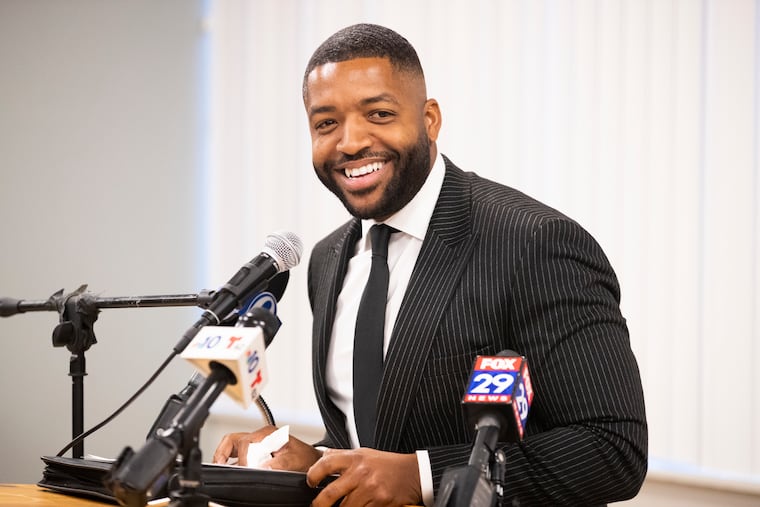And then there were nine: With Amen Brown officially in, the Philly mayoral field could be the largest in years
Nine viable Democrats are jockeying to replace Mayor Jim Kenney. And with no clear front-runners, most of them have a path to the nomination.

State Rep. Amen Brown launched his campaign for Philadelphia mayor on Friday, becoming the ninth Democrat to join the mayoral field that could shape up to be the largest in decades.
The contenders, most of whom have served in office before, span the Democratic ideological spectrum, from Brown, who has championed tough-on-crime policies and school choice, to ex-City Councilmember Helen Gym, an activist-lawmaker and a leader of the city’s progressive movement.
All have said they are running to fix a city facing severe challenges, most notably a gun violence crisis that has left much of Philadelphia concerned about public safety and quality of life.
“This is a very serious moment for our city, and I am not taking this situation lightly,” Brown told about 150 supporters gathered in West Philadelphia Friday. “If we don’t combat the lawlessness to make our citizens safe every single day, then nothing else matters.”
Brown is the last of the Democrats who have publicly flirted with a run to get in the race. The field also includes ex-City Controller Rebecca Rhynhart, grocer Jeff Brown, retired Judge James DeLeon, and former Council members Gym, Allan Domb, Derek Green, Cherelle Parker, and Maria Quiñones Sánchez.
» READ MORE: Who is running for Philadelphia mayor in 2023?
The Democrat who wins in the May primary will be well-positioned to prevail, given the party’s 7-1 voter registration advantage in the city. Republican City Councilmember David Oh is considering running on the GOP side.
None of the candidates will officially be on the ballot until after nomination petitions are circulated and filed, which typically happens in March. Some may drop out before then; others could theoretically jump in. When Mayor Jim Kenney ran for the office for the first time in 2015, he didn’t enter the race until February.
What a deep field means for the race
If the field remains as large as it is, it would be the deepest in years. The last mayoral election that had more than six viable Democratic candidates was 1979, when 11 Democrats were on the ballot. That year, only three ended up winning more than 1% of the primary vote, and William J. Green III won the nomination handily.
Larry Ceisler, a public affairs executive and longtime political observer, said what’s unique about the field this cycle is that there isn’t a clear front-runner, meaning a half-dozen candidates or more have paths to the nomination.
Conventional wisdom might suggest that someone like Gym, who has a fervid base of support, could benefit from a larger field that splits among seven or eight candidates. Gym has already been endorsed by Reclaim Philadelphia, the organization that has been instrumental in pulling the city’s politics to the left since its 2016 founding, and other progressive groups are likely to back her.
» READ MORE: Helen Gym launches a run for Philadelphia mayor on a pledge to address gun violence
Others have speculated that Parker, who leads a voter-rich Northwest Philadelphia ward and has close relationships with labor leaders, may have a similarly loyal base.
But Ceisler said Philadelphia mayoral elections almost always come down to two or three front-runners — not a vote split evenly among nine candidates — meaning each contender needs to expand their ideological or geographic base.
“They’re going to have to fight for every vote,” he said. “If they are in a certain lane, they’re going to have to learn to broaden it. I think there is a sense in the city that people don’t want to be divided.”
A fund-raising blitz
While there is no obvious front-runner now, the contours of the race will become more clear come the end of January, when campaign-finance reports must be filed with the city. Most of the candidates are aggressively fund-raising now so that they can post a noticeable showing next month that signals to other groups and donors that they’re serious.
Domb, a multimillionaire real estate magnate who self-funded two campaigns for City Council, is something of an exception. He is independently wealthy and has spent much of his time over the past several weeks meeting with voters, this week touring parts of Kensington and sitting with Fairmount residents concerned about illegal off-road vehicles.
On Wednesday, he released a public safety plan that includes declaring a crime emergency and cracking down on retail theft.
“It’s a turning point for the city, and residents need to determine, what skill set does the city need?” Domb said. “My biggest skill set is solving problems and getting results. I’m not big on rhetoric.”
Domb is one of only two candidates who have bought a significant amount of advertising so far. He has spent $117,000 on radio ads since November, according to the media-tracking firm Ad Impact.
The other is Jeff Brown, whose campaign has spent $200,000 running television ads. He is the only candidate currently running TV commercials, and they come in addition to $159,000 in TV ads from a dark money super PAC backing his candidacy.
Being the first candidate to advertise on TV could be an advantage. Ceisler pointed to Gov. Tom Wolf, who began advertising on television before any of his opponents when he ran in the Democratic primary in 2014. He advertised consistently, and came out on top.
But big spending is likely in the coming months from other campaigns and independent groups that want to influence the race. Amen Brown is backed by a wealthy New York City real estate developer, and has in the past enjoyed political support from deep-pocketed charter school proponents.
And Parker, who this week released a three-minute digital ad that was largely biographical, may be supported by an outside spending group with ties to Wolf.